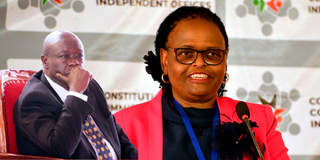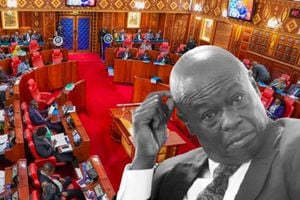
Deputy President Rigathi Gachagua and Chief Justice of Kenya, Martha Koome.
Deputy President Rigathi Gachagua has filed a new petition seeking to block the Senate from acting on the resolution of the National Assembly impeaching him, even as the High Court forwarded several files to Chief Justice Martha Koome for appointment of a bench of judges to deal with issues raised in the petitions.
Mr Gachagua filed the latest case on Friday hoping to get orders blocking the Senate from acting on the resolution of the National Assembly.
High Court judge Chacha directed the matter to be mentioned on Monday for directions.
“That pending the hearing and determination of this application inter-partes a conservatory order be issued restraining the Senate as a whole from admitting, processing, debating or in any other manner whatsoever considering the Motion for the proposed removal of the Deputy President – Hon. Rigathi Gachagua from office by impeachment founded on the notice of motion to the National Assembly,” Mr Gachagua submitted.
Through senior counsel Paul Muite, Mr Gachagua has maintained that the impeachment motion was replete with general unsupported allegations, hearsay and outright lies.
He further said the National Assembly did not conduct a constitutionally compliant public participation exercise prior to passing the impeachment motion on October 8.
Mr Muite said the impeachment motion does not meet the threshold test set by Article 145(1) and the appropriate standard of proof was neither considered nor met when the National Assembly passed the impeachment resolution.
On Tuesday, 281 MPs voted to adopt the 11 charges brought against Mr Gachagua but the DP has challenged the process over inadequate public participation and maintained that the claims are frivolous.
Mr Gachagua has been accused of practising divisive politics and undermining President William Ruto in his agenda.
But the DP said the MPs debated and voted on the motion on grounds other than those set out in the motion.
Vicarious assault
He further said the impeachment was converted into a vicarious assault on family rather than an investigation of constitutional violations by a public servant.
Mr Gachagua also claimed that MPs were subjected to intimidation and undue influence prior to and during the hearing of the motion.
“The entire impeachment process has been designed to avoid and be ring-fenced from judicial scrutiny and accountability. The process has been attended by uncharacteristic speed with the intention of ramming the process through, before it can be audited for constitutional compliance,” he said.
The DP said the MPs prosecuted proceedings on the basis that he had offended the President rather than the Constitution and the law.
“The object of the impeachment exercise appears to have been to please the President rather than examine fidelity to the Constitution of Kenya,” he said.
He has also argued that Speaker and Deputy Speaker of the National Assembly Moses Wetangu’la and Gladys Boss respectively, took a partisan position against him before, during and after the tabling of the impeachment motion in violation of the provisions of Articles 47 and 50.
Earlier, High Court judge Lawrence Mugambi agreed with Mr Gachagua that the issues raised in his petition were weighty and should be considered by a bench of more than two judges.
“I find that given the extensive nature of these proceedings starting from the National Assembly all the way to the Senate and due to the massive public interest the matter has generated, it would require the mind of more than one Judge to determine,” said the judge.
The judge ruled that the six petitions that were before him raised weighty constitutional questions that fall under Article 165 (3) (b) and (d) (ii), “hence I am persuaded to refer them to the Chief Justice for empanelment of a bench”.
By yesterday, a total of 24 petitions had been filed before the High Court with the majority of the cases filed in Nairobi. Other petitions have been filed in Eldoret, Nyahururu and Kerugoya High Court.
Other than the question of public participation, Mr Gachagua and other petitioners have argued that Parliament is improperly constituted and thus incapable of carrying out the impeachment process.
“It is necessary for the citizenry of this country to know whether the current state of law allows them adequate opportunity to participate meaningfully in the process of the removal of their Deputy President,” the judge said.
Mr Gachagua said he was not afforded adequate time to respond to the 11 allegations including gross misconduct and corruption.
Mr Muite submitted that public participation must be purposive and meaningful and not cosmetic. He added that it must be accompanied by reasonable notice and opportunity.
"There was also the question on whether there was adequate public participation and or whether it should be circulated with or without the response of the person who is being impeached," Judge Mugambi stated.
Parliament had opposed the application arguing that there were no substantive questions of law because the issues have been litigated before including the constitutionality of the statutes and dealt with by single judge.
“Considering the immense public interest this matter has generated and being the first of its kind in Kenya where the Deputy President of the Republic is being removed by process of impeachment, it is my considered opinion that this matter deserves the input of the Bench so as to pronounce itself on a process that is constitutionally compliant to serve as benchmarks for future undertakings of this nature,” said the judge.
Mr Muite said he would be writing to the CJ seeking the appointment of the bench before the senators sit to consider the resolution of the National Assembly on Wednesday, October 16.








